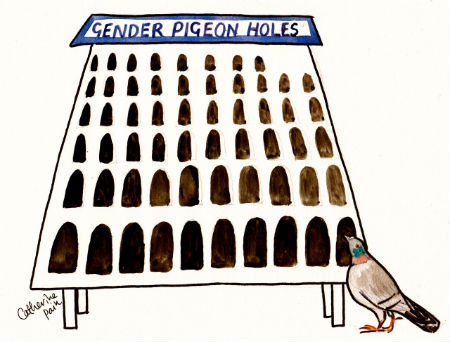This content is associated with The Open University's Open degree qualification.
In the first part of her post Meg Barker welcomed Facebook's change which allows users to pick from more gender options than 'male' and 'female'. In this concluding part she points to some of the problems.
 So what are the problems with Facebook's new ways of capturing gender? Several people have asked whether there is a cynical aspect to the change, given that it may enable companies to better target their social media advertising. But are there also limitations and constraints in what it offers for our understanding of gender?
So what are the problems with Facebook's new ways of capturing gender? Several people have asked whether there is a cynical aspect to the change, given that it may enable companies to better target their social media advertising. But are there also limitations and constraints in what it offers for our understanding of gender?
The first point to make is that the list is not exhaustive. For example it does not include the terms 'femme' and 'butch', which are perhaps two of the most common words which LGBT+ people use to refer to their gender. Consider how it might feel if a major organisation finally made a change designed to encompass people like yourself, but then failed to include your own experience within that. Also, when you choose a custom gender, you no longer have the options of 'male' or 'female' available to you, so there is still perhaps the suggestion that people are either 'male', 'female' or a 'custom gender', rather than all of the genders being placed on an equal footing.
Additionally, in relation to this, the vast majority of the new terms developed in a white, US, context and therefore will not be applicable globally. Of course the change has only been rolled out in the US so far, and I'm not sure what gender terms Facebook has previously had available in South Asia, for example. However, even among those currently living in the multicultural US, there are many people who will understand and experience their genders in ways which are not captured on the list.
For example, as I understand it, no list of gender terms (separate from sexual identity terms) could ever completely capture Thai identities, which often combine elements of gender and sexual identity in one word. There is one word on the list which refers to an indigenous North American gender identity (two spirit). However, there is a risk that this implies that there is one unified indigenous American understanding of gender rather than capturing the diversity of understandings which are actually present across indigenous American communities.
The suggestion of an open box for people to write in whatever gender term they use themselves would be one solution to such issues. However a list of categories probably lends itself more easily to data analysis. This could potentially be useful if Facebook were able to release figures of the numbers of people who are identifying in each way for the reasons of visibility and inclusion mentioned previously.
Finally, having any kind of gender option, by its very existence, implies that gender is relevant. Indeed, it implies that it is perhaps the most important feature of your identity given that it is the first thing that comes up on Facebook's 'basic information'.
Some people have argued that it would be better to have no box for gender rather than just expanding the list of possible genders. As mentioned before, a person's gender status (whether they are cis, trans* or otherwise) is rarely relevant. And – for important reasons – most people generally do not choose to reveal their gender status unless directly relevant (for certain medical procedures, for example). Similarly, although we are used to being asked our gender on all kinds of surveys and documentation, it is actually very rarely relevant.
Research has found that being asked our gender primes us to behave, and even think, in more gender stereotypical ways which can limit us, and the opportunities that are available to us. Perhaps having no gender box at all would be a more radical step in questioning how we currently understand – and prioritise – gender.
I welcome the change that Facebook has made, not least because it opens up the possibility for exactly the kinds of conversations that I'm referring to here. I hope that it will encourage people to keep reflecting on their own understandings of genders in ways that are helpful to themselves and to those around them.
How to change your Facebook gender
Gender options
- Agender
- Androgyne
- Androgynous
- Bigender
- Cis
- Cisgender
- Cis Female
- Cis Male
- Cis Man
- Cis Woman
- Cisgender Female
- Cisgender Male
- Cisgender Man
- Cisgender Woman
- Female to Male
- FTM
- Gender Fluid
- Gender Nonconforming
- Gender Questioning
- Gender Variant
- Genderqueer
- Intersex
- Male to Female
- MTF
- Neither
- Neutrois
- Non-binary
- Other
- Pangender
- Trans
- Trans*
- Trans Female
- Trans* Female
- Trans Male
- Trans* Male
- Trans Man
- Trans* Man
- Trans Person
- Trans* Person
- Trans Woman
- Trans* Woman
- Transfeminine
- Transgender
- Transgender Female
- Transgender Male
- Transgender Man
- Transgender Person
- Transgender Woman
- Transmasculine
- Transsexual
- Transsexual Female
- Transsexual Male
- Transsexual Man
- Transsexual Person
- Transsexual Woman
- and
- Two-Spirit
Find out more
This blog post is part of Society Matters. The blog seeks to inform, stimulate and challenge our understanding of this changing world and of our humbling role within it.
Want to know more about studying social sciences at The Open University? Visit the Social Sciences faculty site.
Please note: The opinions expressed in Society Matters posts are those of the individual authors, and do not represent the views of The Open University.






Rate and Review
Rate this article
Review this article
Log into OpenLearn to leave reviews and join in the conversation.
Article reviews
Anne Goodman - 1 December 2020 4:08pm
I hadn't come across this idea before - but it makes perfect sense to me. Why privilege gender in this way? It isn't important to know this about someone if you think about it. But it is there centre stage because it is a binary totally embedded in our culture. But I guess it is one of the corner stones of patriarchy. Get rid of it and it might help to start to break down patriarchy.
Anthony Muckell - 18 January 2021 12:30pm
I think there are times when gender is important and have too many would make things more complicated. Personally I really don't care what gender someone is. I have friends that that would classify in many ways and to me how they treat others and what we have in common is more important which is a way I think people should be. People should need to explain gender or sexuality.
However, having worked in Financial Services there are times when gender in important in underwriting and male/female needs to be diclosed for mortality rates and morbidity rates. Also when looking at sport male and female competition is still divided, how complicated would the Olympics be if Facebooks 57 options were included. Might it be better that gender and sexuality are more clearly separated rather than the way they are heavily mixed currently. Personally I have never asked anyone in a conversation their LGBTQ+ (orS)status, but maybe my views are wrong and misguided and thats why I'm studying psychology.
Thank you